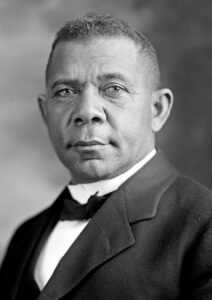Booker T. Washington
February 7, 2022

Booker T. Washington
BOOKER T. WASHINGTON was “mercilessly ridiculed” by black liberals in the North for his insistence that blacks focus on improving themselves and not on attacking whites.
In recognition of Black History Month, here is an excerpt from “Du Bois vs. Washington: Old Lessons Black People Have Not Learned,” by Ellis Washington:
Although born a slave, Booker T. Washington triumphed against an overwhelming set of circumstances to become one of the great Black educators, speakers and university builders in American history. Perhaps even more amazing is that Washington was of such high moral character as to not have any hatred or animosity toward Whites. Neither did he manifest any psychological debilitation from suffering what had to be a traumatic childhood as a slave. One of the many maxims Washington followed was that, “It is a hard matter to convert an individual by abusing him.” He believed that racial reconciliation could only be gained through compromise and finding common ground even among the most radical White segregationists in the South. Washington further stated in his Atlanta speech:
The wisest among my race understand that the agitation of questions of social equality is the extremist folly, and that progress in the enjoyment of all the privileges that will come to us must be the result of severe and constant struggle rather than of artificial forcing.
Washington’s approach to combating White racism was sublime in its simplicity. His starting point was always with the individual: to improve the moral character, personal development and intellectual enhancement of the victims of racism, instead of concentrating on White racism. By focusing the attention away from a negative (White racism) to a positive (Black personal improvement) his philosophy of self-help through industrial education, personal discipline, hard work, would foster racial unity as Blacks, working with each other in their self-contained, racially segregated environments, improved their own lot in life apart from any help from Whites and the federal government. This he found to be the most feasible and comprehensive way to end racism. Washington states further:
The Negro should not be deprived by unfair means of the franchise, but political agitation alone will not save him. Back of the ballot, he must have property, industry, skill, economy, intelligence and character. No race without these elements can permanently succeed. . . . We have a right to enter our complaints, but we shall make a fatal error if we yield to the temptation of believing that mere opposition to our wrongs will take the place of progressive, constructive action. . . . Whether he will or not, a white man respects a Negro who owns a two-story brick house.
Unlike the humble beginnings of Washington, W. E. B. Du Bois was born a free man in the North, of Black, French, Dutch, and American Indian ancestry. “Thank God, no Anglo-Saxon,” he often liked to add. However, Du Bois’s White pedigree cannot be denied. Educated in the best schools of Europe and the United States, he studied with such great minds as George Santayana and William James. In 1895, he became the first Black person to receive a doctorate degree from Harvard. Interestingly, Du Bois represented a privileged group within the Black community coming from a generation of mixed-blooded mulattoes in the North, whose parents were the first generation to reap the fruits of the abolition of slavery. Such people had gained much more in material benefits in comparison to those ex-slaves from the South, who knew well the strictures the color line had on their lives in preventing them from achieving full citizenship rights.
To Du Bois and his contemporaries, Washington’s approach to race relations was viewed as embarrassingly accommodationist to White racism. Du Bois, in many of his writings, like his magnum opus, The Souls of Black Folk, articles in Crisis Magazine, and in numerous speeches, mercilessly ridiculed Washington as the first Uncle Tom, who passively tolerated maltreatment from Whites, in exchange for a pat on the head and the hypocritical embrace of their paternalistic benevolence. Washington’s self-help programs of general industrial education was disdained by Du Bois as humiliating and servile work.
Read more here.
— Comments —
A reader writes:
Recently I borrowed BTW ‘s autobiography Up from Slavery from the library, and was I ever impressed.
He has much to say to our current situation, though it’s easy to miss in his humble, modest diction.
He was a great American, no qualifying adjectives needed.
